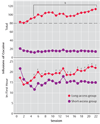Stress, dysregulation of drug reward pathways, and the transition to drug dependence
- PMID: 17671276
- PMCID: PMC2837343
- DOI: 10.1176/appi.ajp.2007.05030503
Stress, dysregulation of drug reward pathways, and the transition to drug dependence
Abstract
This review provides a neuroadaptive perspective regarding the role of the hormonal and brain stress systems in drug addiction with a focus on the changes that occur during the transition from limited access to drugs to long-term compulsive use of drugs. A dramatic escalation in drug intake with extended access to drug self-administration is characterized by a dysregulation of brain reward pathways. Hormonal studies using an experimenter-administered cocaine binge model and an escalation self-administration model have revealed large increases in ACTH and corticosterone in rats during an acute binge with attenuation during the chronic binge stage and a reactivation of the hypothalamic-pituitary-adrenal axis during acute withdrawal. The activation of the hypothalamic-pituitary-adrenal axis with cocaine appears to depend on feed-forward activation of the mesolimbic dopamine system. At the same time, escalation in drug intake with either extended access or dependence-induction produces an activation of the brain stress system's corticotropin-releasing factor outside of the hypothalamus in the extended amygdala, which is particularly evident during acute withdrawal. A model of the role of different levels of hormonal/brain stress activation in addiction is presented that has heuristic value for understanding individual vulnerability to drug dependence and novel treatments for the disorder.
Figures







References
-
- Koob GF. Allostatic view of motivation: implications for psychopathology. In: Bevins RA, Bardo MT, editors. Motivational Factors in the Etiology of Drug Abuse (series title: Nebraska Symposium on Motivation, vol 50); Lincoln, Neb: University of Nebraska Press; 2004. pp. 1–18. - PubMed
-
- American Psychiatric Association. Diagnostic and Statistical Manual of Mental Disorders. 4th ed. Washington, DC: American Psychiatric Press; 1994.
-
- Koob GF, Le Moal M. Drug abuse: hedonic homeostatic dysregulation. Science. 1997;278:52–58. - PubMed
-
- Dole VP, Nyswander ME, Kreek MJ. Narcotic blockade. Arch Intern Med. 1966;118:304–309. - PubMed
-
- Kreek MJ, Koob GF. Drug dependence: stress and dysregulation of brain reward pathways. Drug Alcohol Depend. 1998;51:23–47. - PubMed
Publication types
MeSH terms
Substances
Grants and funding
- R01 MH076537/MH/NIMH NIH HHS/United States
- K05 DA000049/DA/NIDA NIH HHS/United States
- DK26741/DK/NIDDK NIH HHS/United States
- P60 DA005130/DA/NIDA NIH HHS/United States
- R37 AA008459/AA/NIAAA NIH HHS/United States
- DA04398/DA/NIDA NIH HHS/United States
- P50 DA005130/DA/NIDA NIH HHS/United States
- AA08459/AA/NIAAA NIH HHS/United States
- R01 AA008459/AA/NIAAA NIH HHS/United States
- P01 DK026741/DK/NIDDK NIH HHS/United States
- DA05130/DA/NIDA NIH HHS/United States
- P60 AA006420/AA/NIAAA NIH HHS/United States
- DA04043/DA/NIDA NIH HHS/United States
- DA00049/DA/NIDA NIH HHS/United States
- R01 DA004043/DA/NIDA NIH HHS/United States
- R01 DA004398/DA/NIDA NIH HHS/United States
- P50 AA006420/AA/NIAAA NIH HHS/United States
- MH076537/MH/NIMH NIH HHS/United States
- AA06420/AA/NIAAA NIH HHS/United States
- RR024143/RR/NCRR NIH HHS/United States
- UL1 RR024143/RR/NCRR NIH HHS/United States

